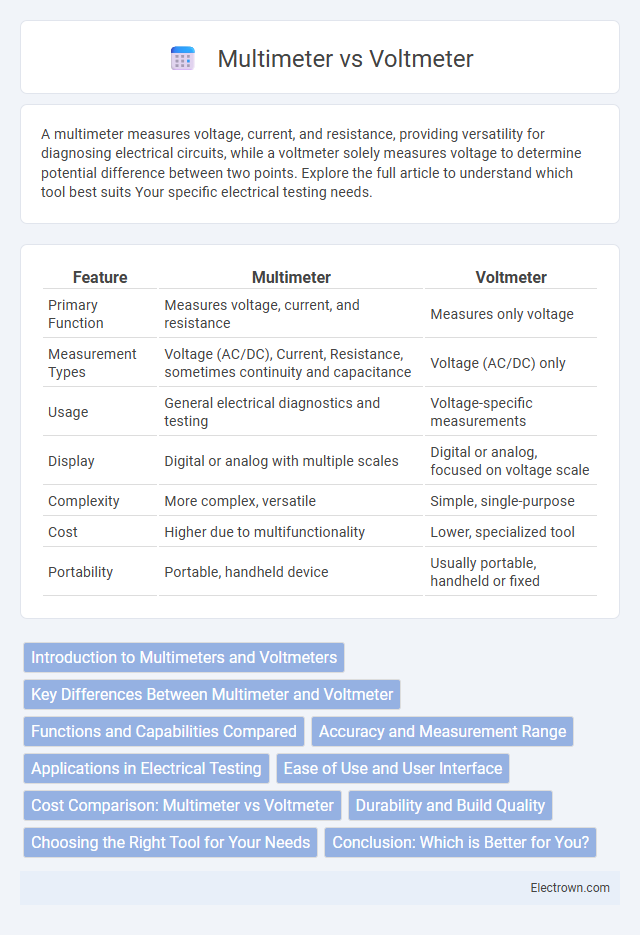A multimeter measures voltage, current, and resistance, providing versatility for diagnosing electrical circuits, while a voltmeter solely measures voltage to determine potential difference between two points. Explore the full article to understand which tool best suits Your specific electrical testing needs.
Table of Comparison
| Feature | Multimeter | Voltmeter |
|---|---|---|
| Primary Function | Measures voltage, current, and resistance | Measures only voltage |
| Measurement Types | Voltage (AC/DC), Current, Resistance, sometimes continuity and capacitance | Voltage (AC/DC) only |
| Usage | General electrical diagnostics and testing | Voltage-specific measurements |
| Display | Digital or analog with multiple scales | Digital or analog, focused on voltage scale |
| Complexity | More complex, versatile | Simple, single-purpose |
| Cost | Higher due to multifunctionality | Lower, specialized tool |
| Portability | Portable, handheld device | Usually portable, handheld or fixed |
Introduction to Multimeters and Voltmeters
Multimeters measure voltage, current, and resistance, providing comprehensive electrical testing in one device. Voltmeters specifically measure electrical potential difference between two points, offering precise voltage readings. Multimeters combine multiple functions, making them versatile tools for diagnosing electrical circuits compared to dedicated voltmeters.
Key Differences Between Multimeter and Voltmeter
A multimeter measures multiple electrical properties such as voltage, current, and resistance, whereas a voltmeter exclusively measures voltage across a component or circuit. Multimeters offer versatility with digital or analog displays and can test AC/DC voltage, current, and resistance, making them essential for comprehensive diagnostics. Voltmeters provide precise voltage readings but lack the multifunctional capability of multimeters, limiting their use to voltage-specific measurements.
Functions and Capabilities Compared
A multimeter measures multiple electrical properties including voltage, current, and resistance, providing versatile diagnostic capabilities for various electrical tasks. A voltmeter, however, specializes solely in measuring voltage, offering precise voltage readings but lacking the broader functionality of a multimeter. Your choice depends on whether you need a single-function tool for voltage measurement or a multifunctional device that can handle diverse electrical testing needs.
Accuracy and Measurement Range
A multimeter offers higher accuracy and a broader measurement range compared to a voltmeter, allowing you to measure voltage, current, and resistance with precision. Voltmeters are specifically designed for voltage measurement, often providing less versatility and limited accuracy over narrow voltage ranges. Choosing a multimeter ensures more accurate readings across diverse electrical parameters, making it ideal for comprehensive diagnostics.
Applications in Electrical Testing
A multimeter offers versatile electrical testing capabilities, including measuring voltage, current, and resistance, making it essential for troubleshooting circuits and diagnosing electronic devices. Voltmeters specialize in accurately measuring voltage, ideal for verifying power supplies and monitoring voltage levels in electrical systems. Both tools are fundamental in electrical testing, with multimeters providing broader functionality for detailed diagnostics and voltmeters ensuring precise voltage readings.
Ease of Use and User Interface
Multimeters offer a versatile user interface with multiple functions such as measuring voltage, current, and resistance, making them ideal for comprehensive electrical diagnostics. Voltmeters typically feature a simpler, more straightforward display focused solely on voltage measurement, which can be easier for beginners or specific tasks. The presence of digital screens and rotary dials in multimeters enhances precision and usability, whereas analog voltmeters may require more interpretation, affecting ease of use for some users.
Cost Comparison: Multimeter vs Voltmeter
A multimeter generally costs more than a voltmeter due to its multifunctional capabilities, including measuring voltage, current, resistance, and sometimes even temperature or frequency. Voltmeters are more affordable and specialized, designed solely for voltage measurement, making them a cost-effective option for users needing only voltage readings. Your choice depends on whether you require versatile diagnostic tools or just simple voltage measurement, impacting the overall investment.
Durability and Build Quality
Multimeters typically offer enhanced durability and robust build quality compared to voltmeters, as they are designed for versatile use in demanding environments, including industrial and field settings. High-quality multimeters often feature reinforced casings, shock-resistant designs, and sealed buttons to withstand drops, moisture, and dust. If you require reliable, long-lasting equipment for various electrical measurements, investing in a rugged multimeter ensures better protection and extended device lifespan.
Choosing the Right Tool for Your Needs
A multimeter offers versatility by measuring voltage, current, and resistance, making it ideal for comprehensive electrical diagnostics. A voltmeter specializes in measuring voltage only, providing precise readings when you need focused voltage assessment. Choosing the right tool depends on whether you require detailed analysis with multiple functions or quick, accurate voltage measurements for your project.
Conclusion: Which is Better for You?
A multimeter offers versatility by measuring voltage, current, and resistance, making it suitable for diverse electrical tasks, while a voltmeter specializes solely in voltage measurement, often providing higher precision for that specific purpose. Choosing between the two depends on your specific needs: opt for a multimeter if you require a comprehensive diagnostic tool, or a voltmeter if your primary focus is accurate voltage readings. For electricians, engineers, or hobbyists seeking a multifunctional instrument, a multimeter is generally better, whereas a voltmeter suits applications demanding focused voltage monitoring.
multimeter vs voltmeter Infographic

 electrown.com
electrown.com